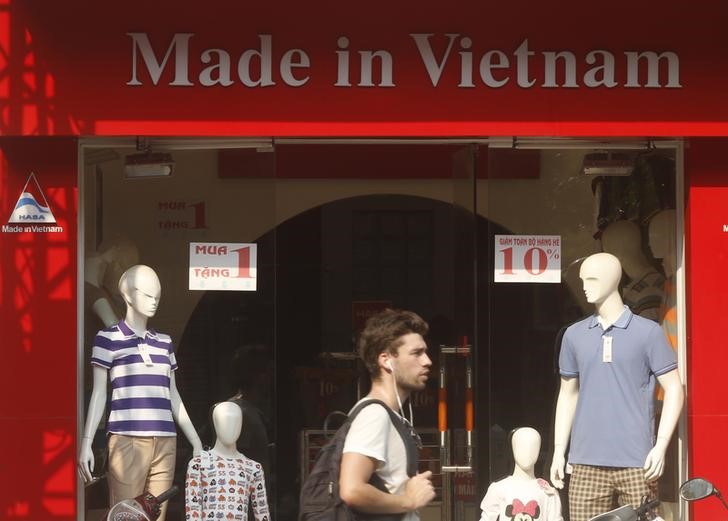Intel stock extends gains after report of possible U.S. government stake
Investing.com - Vietnam's economy stands to take a "severe hit" from U.S. President Donald Trump's tariffs should they stay in place despite overtures from the country to secure concessions from the White House, according to analysts at Capital Economics.
Vietnam, a long-time manufacturing hub for a slew of Western companies which counts the U.S. as its biggest export market, had a 46% tariff rate placed on it last week by Trump.
In a note to clients, the analysts said that Trump could still be "open to doing deals," adding that "most countries" -- including Vietnam -- will eventually end up facing tariffs of between 10% to 20%.
"But even if a deal [...] is agreed soon, the shock to domestic and foreign investor confidence from the tariff announcements mean economic growth is likely to be weaker" in Vietnam, the analysts said. They projected that, at its current level, the tariff could reduce demand for Vietnamese exports by "between a quarter and a half" in the near term.
Given that U.S. demand makes up roughly 8% of Vietnam's economy, this would suggest a fall in the country's gross domestic product of up to 4%, all else being equal, the analysts said.
On Monday, Vietnamese Prime Minister Pham Minh Chinh reportedly said that the southeast Asian nation will buy more American goods, including security and defense products, and has asked the Trump administration for a 45-day reprieve from the levies.
Hanoi has also pledged to push for faster deliveries of commercial planes that Vietnamese carriers ordered from the U.S., Chinh told a cabinet meeting, Reuters reported.
Vietnam was hoping to reach a deal with the U.S. that would delay the 46% U.S. duty and create a system of "balanced and sustainable trade," a statement quoted by Reuters said.
Top White House trade advisor Peter Navarro, however, noted concerns in an interview with CNBC on Monday over Vietnam's alleged role in intellectual property issues and transhipping from China, as well as the dumping of several goods.
Chinh said Vietnam would move to review issues like monetary policy, exchange rates, non-tariff barriers and crack down on the origin of goods. It would also add more content on tax and intellectual property to a trade agreement with the U.S.
Trump previously said that he had spoken with Vietnamese leader To Lam about a deal to remove the tariffs.
Markets are still attempting to understand if the Trump administration plans to impose the tariffs permanently or use them as a cudgle during negotiations with trading partners. On Monday, Trump said "both can be true."
(Reuters contributed reporting.)
